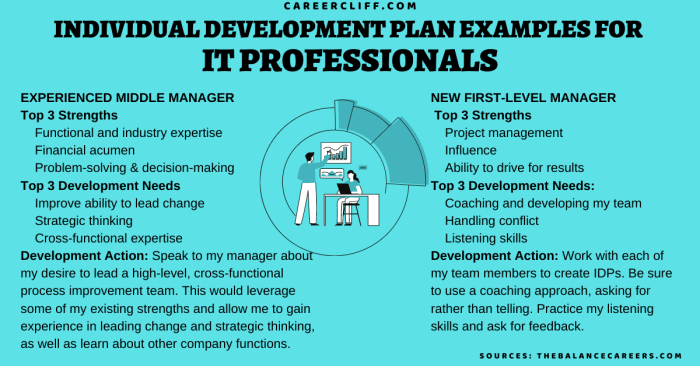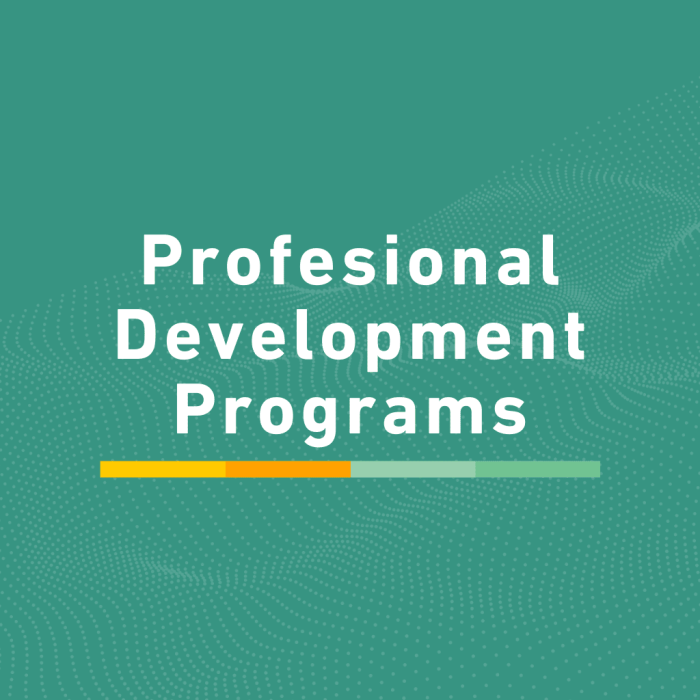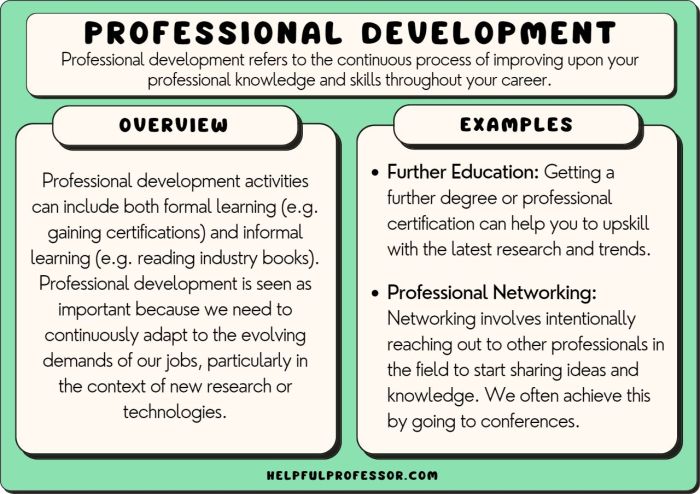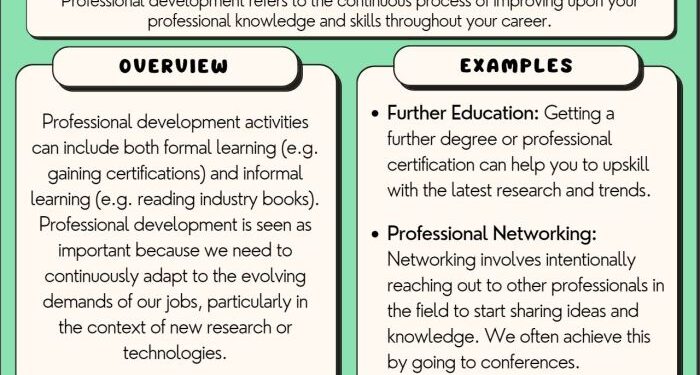Embark on a journey through the realm of Professional development for IT professionals, where the significance of continuous growth and learning is illuminated. Discover how staying updated with the latest trends can shape the success of IT professionals in today's dynamic landscape.
Explore the various types of professional development opportunities, effective strategies, and ways to overcome challenges in this ever-evolving field.
Importance of Professional Development in IT
Continuous professional development is essential for IT professionals to stay relevant in a rapidly evolving industry. As technology advances at a rapid pace, IT professionals need to constantly update their skills and knowledge to remain competitive in the job market and provide value to their organizations.
Benefits of Continuous Learning
- Enhanced Skills: Continuous learning allows IT professionals to acquire new skills and stay up-to-date with the latest technologies, making them more versatile and adaptable in their roles.
- Career Advancement: By investing in professional development, IT professionals can increase their chances of career progression and access better job opportunities.
- Increased Job Satisfaction: Learning new technologies and techniques can lead to greater job satisfaction and a sense of accomplishment in one's work.
Impact of Staying Updated
- Competitive Edge: IT professionals who stay updated with the latest technologies have a competitive edge over their peers and are more likely to succeed in their careers.
- Efficiency and Productivity: Knowledge of new technologies can help IT professionals streamline processes, increase efficiency, and boost productivity within their organizations.
- Innovation: Continuous learning fosters innovation and creativity, enabling IT professionals to come up with new solutions and ideas to address complex challenges.
Types of Professional Development Opportunities
Professional development opportunities for IT professionals come in various forms, each offering unique benefits to enhance skills and knowledge in the field.
Formal Education vs. Online Courses
Formal education, such as pursuing a degree in computer science or IT-related fields, provides a comprehensive and structured learning experience. On the other hand, online courses offer flexibility and accessibility, allowing professionals to learn at their own pace and convenience.
- Formal Education:
- Provides in-depth theoretical knowledge
- Offers hands-on experience through labs and projects
- May require a significant time and financial commitment
- Online Courses:
- Flexible scheduling for working professionals
- Wide range of topics and specializations available
- Cost-effective compared to traditional education
Significance of Certifications and Workshops
Certifications and workshops play a crucial role in enhancing IT skills by providing practical knowledge and industry-recognized credentials.
- Certifications:
- Validate expertise in specific technologies or platforms
- Enhance credibility and employability
- Stay updated with the latest industry trends and best practices
- Workshops:
- Hands-on training in specialized areas
- Opportunity to network with industry professionals
- Gain practical skills for real-world applications
Strategies for Effective Professional Development

Professional development is crucial for IT professionals to stay relevant in a rapidly evolving industry. To ensure continuous growth and success, IT professionals can follow these strategies:
Create a Personalized Professional Development Roadmap
Developing a personalized professional development roadmap is essential for IT professionals to identify their career goals and the necessary steps to achieve them. This roadmap should include:
- Assessing current skills and knowledge to determine areas for improvement
- Setting short-term and long-term goals for career advancement
- Identifying relevant training courses, certifications, and workshops
- Establishing a timeline for achieving each milestone
Set Achievable Goals for Continuous Learning
Setting achievable goals is key to continuous learning and professional growth in the IT industry. IT professionals can follow these steps to set effective goals:
- Define specific and measurable objectives that align with career aspirations
- Break down larger goals into smaller, manageable tasks
- Regularly review and adjust goals based on progress and feedback
- Celebrate accomplishments to stay motivated and inspired
Importance of Networking and Mentorship
Networking and mentorship play a vital role in the professional development of IT professionals by providing valuable opportunities for learning, collaboration, and growth. Here's why networking and mentorship are crucial:
- Networking allows IT professionals to build connections, share knowledge, and discover new opportunities in the industry
- Mentorship provides guidance, support, and valuable insights from experienced professionals to help navigate challenges and accelerate career development
- Engaging with peers, mentors, and industry experts can broaden perspectives, foster innovation, and enhance professional skills
Overcoming Challenges in Professional Development

In the fast-paced field of IT, professional development is crucial for staying relevant and advancing in your career. However, IT professionals often face various challenges that can hinder their pursuit of continuous learning and growth. Let's explore some common obstacles and effective strategies to overcome them.
Time Constraints
One of the biggest challenges for IT professionals when it comes to professional development is finding the time to dedicate to learning while juggling a demanding workload. Here are some strategies to overcome time constraints:
- Prioritize and schedule: Identify the most important areas for your professional development and schedule dedicated time for learning and skill-building.
- Utilize micro-learning: Break down learning tasks into smaller, manageable chunks that can be completed during short breaks or downtime.
- Take advantage of resources: Explore online courses, webinars, and other flexible learning options that allow you to learn at your own pace.
Motivation and Focus
Staying motivated and focused on continuous learning can be challenging, especially when faced with setbacks or distractions. Here are some tips to help you maintain your motivation and focus:
- Set clear goals: Define specific learning objectives and career milestones to keep yourself motivated and on track.
- Reward yourself: Celebrate small achievements along the way to maintain a positive mindset and reinforce your commitment to learning.
- Stay connected: Join professional networks, forums, or study groups to stay engaged with like-minded individuals and share knowledge and experiences.
End of Discussion

In conclusion, investing in professional development not only enhances skills but also opens doors to new opportunities in the IT industry. Stay motivated, keep learning, and pave your path to a successful IT career.
FAQ Corner
How can ongoing professional development benefit IT professionals?
Continuous learning helps IT professionals stay ahead in a rapidly changing industry, enhancing their skills and opening up new opportunities.
What are some common obstacles IT professionals face in pursuing professional development?
Time constraints, balancing work responsibilities, and lack of motivation are common challenges faced by IT professionals.
How important is networking and mentorship in professional development for IT professionals?
Networking and mentorship play a crucial role in providing guidance, support, and valuable connections for IT professionals to grow in their careers.










